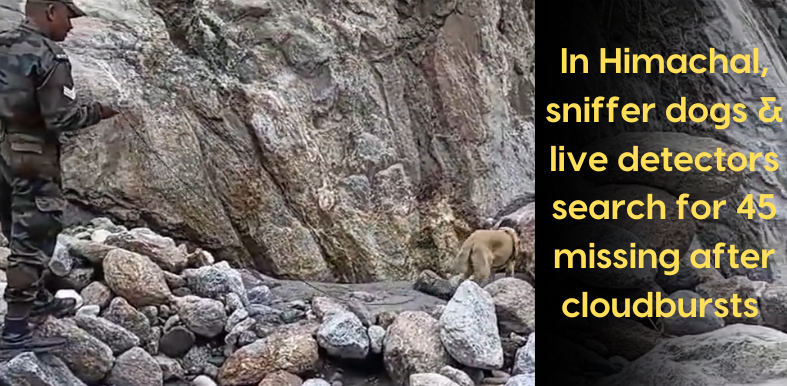In Himachal, sniffer dogs & live detectors search for 45 missing after cloudbursts

Despite extensive search efforts, 45 persons remain unaccounted for about 76 hours after a catastrophic flashflood in Himachal Pradesh. Among the missing are 36 persons from Samej in Rampur subdivision of Shimla district where not a single person has been located since the disaster struck.
In response to the dire situation, the administration has deployed live detector devices and sniffer dogs to aid in the search. These tools will be crucial in the search operation as teams dig at spots indicated by the sniffer dogs, using JCB machines to uncover possible survivors.
Multiple agencies, including the National Disaster Response Force, State Disaster Response Force, Central Industrial Security Force, local police and Home Guard personnel are involved in the ongoing search operations. However, after three days with no significant breakthroughs, hopes of finding survivors under the debris are fading.
In Chauharghat of Mandi district, the body of another woman was recovered on Saturday, following a flood that left 11 persons missing on Wednesday night. While six bodies have been recovered and one person was rescued with injuries, four persons, including two girls aged three months and 11 years, are still missing.
In Bagipul of Kullu, seven persons, including five members of a single family, went missing. Search teams have recovered the bodies of a man and a woman, leaving five persons, including two Nepali nationals, unaccounted for. A slight respite has come in the form of a 55-hour dry spell, which has allowed the water levels in the dangerously swollen rivers and streams to recede.
The live detector devices being used in the rescue efforts are vital for detecting life signs under the debris. These devices utilise wireless or wired seismic sensors to identify vibrations and accurately locate victims.
Featuring a waterproof communication system and a 26-foot-long cable, these devices enable contact with buried victims and assess their needs. The Leader Search Control Box, used in these operations, is lightweight, compact, and powered by a rechargeable battery with a 1.5-hour life.




